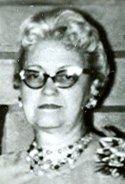
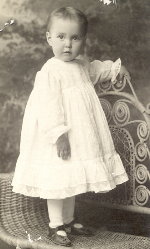 Bertha was born on December 1, 1909, to Allen Newman Tanner and Mary Emily Barlow Tanner—the second-to-youngest of eight children—on a cattle ranch in Grouse Creek, Utah. The boys were Lesley (Les), Raymond (Ray), the twins Herbert (Herb) and Delbert (Del), and David Edwin (Ted). The other girls were Amanda (Mandy) and Evelyn (Ev). Although the family was fairly prosperous—they lived in one of the few two-story houses (the first brick house) in town, they had the first built-in bathtub, etc.—running a cattle ranch is hard work; while the men and boys worked the cattle and the fields, the girls helped their mother. They cooked for family and field hands on a wood stove that also provided heat for the house and heated water for dishwashing, laundry, and bathing. They did laundry, pouring water heated on the stove into a hand-operated washing machine, then hanging the clothes outside on the clothesline to dry. They ironed using heavy, cast-iron flatirons heated on the stove. Sewing was done by hand or treadle sewing machine. And of course there was always cleaning to be done.
Bertha was born on December 1, 1909, to Allen Newman Tanner and Mary Emily Barlow Tanner—the second-to-youngest of eight children—on a cattle ranch in Grouse Creek, Utah. The boys were Lesley (Les), Raymond (Ray), the twins Herbert (Herb) and Delbert (Del), and David Edwin (Ted). The other girls were Amanda (Mandy) and Evelyn (Ev). Although the family was fairly prosperous—they lived in one of the few two-story houses (the first brick house) in town, they had the first built-in bathtub, etc.—running a cattle ranch is hard work; while the men and boys worked the cattle and the fields, the girls helped their mother. They cooked for family and field hands on a wood stove that also provided heat for the house and heated water for dishwashing, laundry, and bathing. They did laundry, pouring water heated on the stove into a hand-operated washing machine, then hanging the clothes outside on the clothesline to dry. They ironed using heavy, cast-iron flatirons heated on the stove. Sewing was done by hand or treadle sewing machine. And of course there was always cleaning to be done.
Any spare time not spent on chores they enjoyed (depending on the season) picnics, berry-picking, horseback riding, rodeos, dances at the church, sleigh riding, and just plain playing. Best of all, for Bertha, there were books to read! She loved to read—there was just so much she wanted to learn. Because of her love of reading and her curiosity about the world, she excelled in school. And her handwriting was so clear and beautiful that, even at a very young age, the teacher would have her write the lessons on the blackboard.
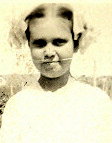 The school in Grouse Creek consisted of grades 1 through 8, divided into three rooms with one teacher per room. After completing the eighth grade, Bertha caused a stir when she insisted on going to high school (girls didn’t usually go past the eighth grade). Somehow, she convinced her parents to support her desire for education, and she moved into Ogden and boarded with family friends while attending Ogden High.
The school in Grouse Creek consisted of grades 1 through 8, divided into three rooms with one teacher per room. After completing the eighth grade, Bertha caused a stir when she insisted on going to high school (girls didn’t usually go past the eighth grade). Somehow, she convinced her parents to support her desire for education, and she moved into Ogden and boarded with family friends while attending Ogden High.
After graduating high school, she decided that there were lots more things she had to learn about, so she went on to major in Education at the Weber Academy (now Weber State University).
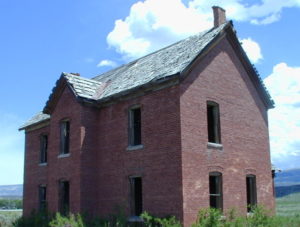
Tanner Home
Visits home from school for Bertha meant riding the train across the Great Salt Lake to Lucin, where someone would meet her and take her home to Grouse Creek. On one of these trips she caught the eye of a young man named Henry Child, who was working on the railroad in Lucin. He asked one of his buddies about her, and the friend told him who she was, but said he shouldn’t bother getting interested because she was too stuck up—being a college girl and all. Henry replied that stuck up or not, he thought he just might marry her.
Bertha’s dark-eyed good looks and vivacious personality attracted many suitors, and she had an active social life during college. Eventually, however, Henry’s persistence paid off, and after she graduated from Weber, they became engaged.
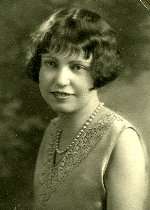 Bertha and Henry had to wait to get married, since married women were not offered jobs teaching school—teaching jobs were reserved for married men with families to support or men who might get married and have families to support. Single women were the third choice. It was during the depression, and jobs were scarce, so she felt lucky to be offered a teaching position in Clear Creek, Utah. Her school was a lot like the one she had attended as a child, except that she was the only teacher. She taught grades 1 through 8 in one room. Her first task of the day was to build a fire in the wood stove that provided heat for the school. After Clear Creek, she taught at a similar school in Lucin, where in the winter the snow was often so deep that she had to wade though hip-deep snow to the railroad tracks and walk on them to the school, since the tracks were always kept clear although the roads weren’t.
Bertha and Henry had to wait to get married, since married women were not offered jobs teaching school—teaching jobs were reserved for married men with families to support or men who might get married and have families to support. Single women were the third choice. It was during the depression, and jobs were scarce, so she felt lucky to be offered a teaching position in Clear Creek, Utah. Her school was a lot like the one she had attended as a child, except that she was the only teacher. She taught grades 1 through 8 in one room. Her first task of the day was to build a fire in the wood stove that provided heat for the school. After Clear Creek, she taught at a similar school in Lucin, where in the winter the snow was often so deep that she had to wade though hip-deep snow to the railroad tracks and walk on them to the school, since the tracks were always kept clear although the roads weren’t.
After teaching for a few years her desire for a home and family of her own finally won out over her love of teaching, and Bertha and Henry were married in the Salt Lake Temple on June 20, 1933. It was still the Depression, Bertha no longer had an income, and they were pretty broke. So after a one-night honeymoon at the Hotel Utah across from the Temple, they returned to Ogden on the Bamberger train. When they arrived in downtown Ogden, the only money they had was one dime—enough to take the streetcar to South Ogden where they would be staying, or to buy an ice-cream cone. They opted for the ice cream, and walked home to South Ogden, holding hands.
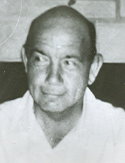
Henry Child
They settled down in South Ogden and Henry began building houses, while Bertha began building a family. At reasonable 2-year intervals, they had two girls and a boy: Carolyn, Allen Guy, and Carma. Bertha devoted herself to becoming a wonderful homemaker—her meals were the best, her house the cleanest, her wash the whitest and brightest, her bottled fruits, jams, jellies, and chili-sauce could have won prizes.
World War II started and many men entered the armed services. There was also a need for defense workers at military installations and factories. Soon the schools began to feel an acute shortage of teachers, so Bertha was persuaded to return to teaching. She taught second grade at Birch Creek Elementary in South Ogden. Carolyn and Allen attended Birch Creek, so they could all go to school together. Teaching just one grade was a piece of cake for her, after her previous experience as a school-marm, teaching eight grades at once.
Although she was a popular and effective teacher, when the war ended she returned to being a full-time homemaker. The family joined the post-war baby-boom with the addition of another daughter, Colleen.
In the following years Bertha put her teaching skills to good use in a variety of church positions at the ward and stake levels. One of her more notable experiences was teaching Primary to blind students at what was then called the Ogden School for the Deaf and Blind. Hers was the first graduating class from the Primary at the school. (At 92, she is currently serving as a District Visiting Teacher Leader.)
She was also quite active in local politics, and served as either registration agent or election judge at nearly every election. Before computers, the name and address of each registered voter had to be copied by hand into three different books. As registrar, her handwriting in the books that Bertha wrote so impressed the Weber County Clerk that he hired her to copy all of the election books for the county. For years she copied every name of every voter into three different books for every election for a few cents per name. After the day’s housework was done, the dishes washed and put away, and the kids in bed, you would find her with the books spread out on the kitchen table, writing late into the night.
The family lived mostly in South Ogden in houses built by Henry to Bertha’s design, but they also lived in Ogden and in Sunset. After the kids were all raised and scattered around the country, they bought a lot in Roy. Henry built a duplex on it, and they settled into the home where they would spend the next 35 or so years. (The world’s best neighbors were encouragement to stay.)
The years had brought them lots of good times, as well as some bad times. The hardest for Bertha and Henry was the loss of their only son, Allen, when he was 44 years old.
Bertha and Henry had also had some health setbacks (they both suffered heart attacks, for instance, and Bertha underwent treatment for breast cancer). Bertha had always loved to travel, and she became determined to see the world while they still could. There were so many places that she had read about, and she wanted to see them for herself. Henry was not as excited about it as she was, but after he was persuaded to take a trip or two, he began looking forward to their travels. They visited Alaska and Canada,Russia, several European, Scandinavian, and Asian countries, Caribbean and South Pacific islands, Australia and New Zealand, as well as most of the United States.
After being hit by a car, Henry’s health began to fail and he finally retired at the age of 79. Soon their travels were limited to visiting their daughters in Las Vegas, Nevada, and in California. Bertha devoted several years to caring for him as his health continued to fail. After several serious illnesses and close calls, he passed away in 1994.
After Henry’s passing, Bertha had some serious health problems herself. Her strong spirit and determination served her well, however, and she soon enjoyed good health and an active life. She continued her quest to see the world and its people—visiting more European and Mediterranean countries, as well as Northern Africa (including Israel and Egypt), and cruising along the east coast of South America and up the Amazon River. Between trips to exotic foreign locations, she has been on an LDS Temple tour of westernCanada and the United States, and has made numerous visits to family in Nevada, Arizona, and California. Bertha celebrated her 91st year on a cruise to Japan, Siberia, South Korea, and China (where she climbed the Great Wall).
Bertha and Henry’s family has grown to include 10 grandchildren, 35 great-grandchildren, and four great-great-grandchildren. As the new century progresses, Bertha can look back on many accomplishments, and look forward to many more adventures.
Bertha passed away on October 27, 2003 and is buried at Washington Heights Memorial Park in Ogden, Utah.
